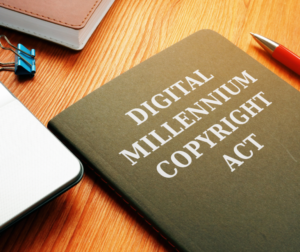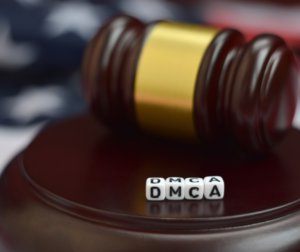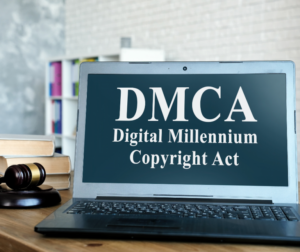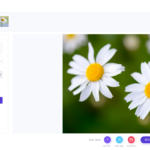What is the DMCA all about and how can it help you protect your content?
The Digital Millennium Copyright Act (DMCA) is a law that was designed to provide copyright protection for online content. It also provides penalties for those who violate the copyright of others online. The DMCA has been proven to be an effective way to protect creators of digital content and their intellectual property, but it can be hard to understand without an expert helping you through it. This article will give you the basics of what DMCA is, how it works, and why it’s necessary in today’s world. 
What is DMCA and How Does It Work
The Digital Millennium Copyright Act (DMCA) was enacted by the U.S. Congress in 1998 to address copyright issues when it comes to digital media and online content. The DMCA is intended to provide a legal framework for intellectual property enforcement, while also limiting the liability of internet service providers that unknowingly host infringing material or otherwise facilitate access thereto.
The DMCA provides a safe harbor against claims of contributory copyright infringement if a provider can show it has had “no actual knowledge” that certain information infringed copyrights and acted expeditiously to remove such material after learning of its presence on their systems, among other requirements as set forth in the statute itself.
The DMCA is intended to provide a legal framework for intellectual property enforcement, while also limiting the liability of internet service providers that unknowingly host infringing material or otherwise facilitate access thereto.
The statute provides a safe harbor against claims of contributory copyright infringement if a provider can show it has had “no actual knowledge” that certain information infringed copyrights and acted expeditiously to remove such material after learning of its presence on their systems, among other requirements as set forth in the statute itself. 
Who Should Register Their Content with the U.S Copyright Office
Do you want to legally protect your content? If so, it is important that you register a copyright with the U.S Copyright Office. Registering copyright will ensure that your intellectual property and creative work are protected from being used without permission or compensation.
The more people upload their videos, music, articles, and other works to the internet, there is increased risk of losing control over them in ways such as infringements or unauthorized use by others on sites like YouTube / Facebook/Instagram.
Registering copyright can help combat this issue and provide protection for both creators and users of copyrighted materials!
– If you are an artist, author, or composer creating artistic works that people can buy like paintings, photographs, and music.
– If you run a website with original content such as recipes, articles and photos.
When You Need to File a DMCA Takedown Notice
If you have found your content on someone else’s website without your permission, you may need to file a DMCA takedown notice with the site owner. This is typically done when an article or video goes viral and the author does not want it shared anymore because they are no longer connected to it. The Digital Millennium Copyright Act (DMCA) was enacted in 1998 by President Bill Clinton and Vice-President Al Gore for this very reason! 
The DMCA is a copyright statute that defines what constitutes an infringement of the rights of copyright holders. The Act provides legal protection for content creators against piracy and theft by making it illegal to copy or distribute copyrighted work without permission, with some exceptions. This applies not just to digital media but also covers physical copies as well.
If you have found your content on someone else’s website without your permission, you may need to file a DMCA takedown notice with the site owner who has violated your ownership rights under this law.
Once they receive notification from their host provider – like HostGator – the offending material will be taken down within 24 hours at most after the review unless an appeal was filed in which case there would be more time allotted before removal occurs.
How to Protect Yourself Against Copyright Infringement
Copyright infringement is a big problem for many content creators. It can be difficult to know what your legal rights are and what steps you should take if you or one of your clients is a victim of copyright infringement. This blog post will help guide you through some important copyright law basics and provide advice on how to protect yourself against this type of violation.
Copyright law is comprised of both federal and state laws. The Federal Copyright Act, 17 U.S.C. §101 et seq., establishes the types of works that are protected by copyright as well as various protections afforded to those who register their work with the United States Copyright Office or who have been granted “common law” rights in particular work through publication without proper registration (17 U.S.C §§406-408).
State statutes vary widely but generally provide protection for authors against unauthorized reproduction, distribution, public performance, and/or display of their original creation such as literary manuscripts; musical compositions; dramatic works including scripts and screenplays; paintings; pictorials including photographs and drawings; motion pictures and other audiovisual materials. 
What are the Penalties for Violating the DMCA
The Digital Millenium Copyright Act (DMCA) is a law that was enacted in 1998. The goal of the DMCA is to help protect copyrighted works by preventing people from copying them on digital networks without authorization. There are many penalties for violating the DMCA, but they can be summed up into civil and criminal categories. If you violate the terms of service with your ISP or host provider, then this is considered a civil violation and usually results in termination of contract or suspension of services.
Criminal violations include distribution and manufacturing illegal copies as well as tampering with copyright data. These are more serious offenses because they involve jail time and fines for those who break the law!
Why You Should Always Use Original Content When Creating Your Own Website or Blog Post
We all know that using original content is a major factor in attracting visitors to your website. However, there are many people who still decide to copy and paste content from other websites. Why? Do they not understand what the consequences could be? If you want a successful blog or website, you need to put in the effort of creating unique content. Here are some of the reasons why it’s important:
-It will help make your site look more professional
-You can rank higher on search engines
-You won’t get penalized by Google for duplicate content
-It will save you a lot of time
-You can avoid copyright infringement issues.
Conclusion
The penalties for violating the DMCA can be severe, but they’re not just limited to fines. If you use someone else’s copyrighted material without their consent and it is determined that your actions are willful, then criminal charges could also apply. Remember that if you want to avoid copyright infringement at all costs, always create original content when creating a blog post or website of any kind.

































